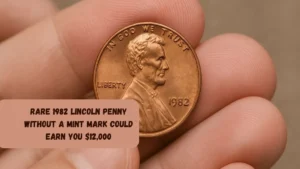In the world of coin collecting, certain coins stand out not just for their age but for their unique characteristics and rarity.
One such coin is the 1982 Lincoln penny without a mint mark, which has gained considerable attention for its potential value, sometimes reaching up to $12,000.
This article explores the details of this coin, explaining why it holds such value and how you can spot one.
Understanding the 1982 Lincoln Penny
The year 1982 was significant for the U.S. Mint because it marked a shift in penny production—from 95% copper to a copper-coated zinc core.
This change resulted in seven different types of 1982 pennies, which vary based on their metal content, date style, and presence or absence of a mint mark.
Key Features of the Valuable 1982 Penny
To identify if you have the rare and valuable 1982 penny, look for these traits:
- No Mint Mark: Coins without a mint mark were produced in Philadelphia.
- Small Date: The numbers in the date appear thinner and more delicate compared to the large date variant.
- Copper Composition: The coin should weigh about 3.11 grams, showing it’s made of copper rather than zinc.
- Excellent Condition: Coins graded Mint State (MS) 65 or above carry higher value.
Detailed Breakdown of 1982 Penny Varieties
| Variety | Mint Mark | Composition | Date Size | Approximate Weight | Potential Value |
|---|---|---|---|---|---|
| 1982 Large Date Copper | None | Copper | Large | 3.11 grams | $0.05 – $16 |
| 1982 Small Date Copper | None | Copper | Small | 3.11 grams | Up to $12,000 |
| 1982 Large Date Zinc | None | Zinc | Large | 2.5 grams | Face value |
| 1982 Small Date Zinc | None | Zinc | Small | 2.5 grams | Face value |
| 1982-D Large Date Copper | D | Copper | Large | 3.11 grams | $0.05 – $16 |
| 1982-D Large Date Zinc | D | Zinc | Large | 2.5 grams | Face value |
| 1982-D Small Date Zinc | D | Zinc | Small | 2.5 grams | Face value |
Why Is the 1982 Small Date Copper Penny So Valuable?
The 1982 Small Date Copper penny without a mint mark is considered an error coin from the transition period.
During the switch from copper to zinc pennies, a few copper blanks were mistakenly used for the small date design. This rarity, combined with the error, makes the coin highly desirable for collectors.
Coins in pristine condition (MS65 or better) have sold at auctions for as much as $12,000.
How to Identify the 1982 Small Date Copper Penny
- Weigh the Coin: Use a precise scale to confirm the weight is close to 3.11 grams.
- Look at the Date: The small date has thinner numbers, and the “2” in “1982” has a curved shape.
- Check for Mint Mark: Confirm that no mint mark appears below the date.
- Evaluate Condition: Coins with sharp details and no wear are more valuable.
The 1982 Lincoln penny without a mint mark, featuring the small date and copper makeup, is a fascinating example of minting quirks. Its scarcity and background story make it a treasured item for collectors.
If you find such a penny, it’s best to have it professionally authenticated and graded to determine its true worth.
FAQ
Q: How can I tell if my 1982 penny is copper or zinc?
A: Weigh the penny on a precise scale. Copper pennies weigh about 3.11 grams, while zinc ones weigh around 2.5 grams.
Q: What does “no mint mark” mean?
A: It means the coin was made at the Philadelphia Mint, which didn’t place a mint mark on pennies that year.
Q: Why is the small date version more valuable than the large date?
A: The small date copper penny is rarer due to a minting error during the transition from copper to zinc.
Q: Should I get my coin graded?
A: Yes, professional grading can verify authenticity and condition, which greatly impacts its value.

